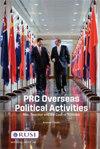III. The Politics of Gulf–Asian Security Cooperation
Q4 Social Sciences
引用次数: 0
Abstract
Security cooperation remains the most concrete expression of a rapprochement between two countries. It indicates the operation of a diplomatic proximity and ensures that public pledges are substantiated. At the same time, bilateral security cooperation can only become effective if the capabilities of both sides are meaningful by themselves. In other words, exchanges between security forces – intelligence services, military or police forces – will have strategic significance not simply because of the aspirations of national leaders, but because of technical criteria: the readiness and interoperability of their personnel; the frequency of their interactions with the other side; and the scope of the exchanges all inform the level of operation for a bilateral security cooperation. This is why, in the case of Gulf–Asian relations, this cooperation has to be understood in the broader context of the evolution of both Asian and Gulf security politics. During the past decade, while Gulf energy exports have leaned towards the Asia-Pacific region, national armed forces in the peninsula have undergone an ambitious modernisation process. The traditional reliance on US protection through military bases operated by US armed forces in the region remains valid, but its extent has lessened compared to the 1990s. This is the result of changes in terms of capabilities, training and strategic ambitions of Gulf states. The massive arms sales of the past two decades and the rise of a new generation of officers educated since the 1991 Gulf War are now turning the militaries of countries such as Saudi Arabia and the UAE into major regional players. At the same time, Gulf leaders have become more strategically ambitious. The UAE and Qatar contributed to NATO air operations in Libya in 2011 as well as to3海湾-亚洲安全合作的政治
安全合作仍然是两国和解的最具体表现。它表明外交接近的运作,并确保公开承诺得到证实。同时,只有双方的能力本身有意义,双边安全合作才能有效。换句话说,安全部队- -情报部门、军队或警察部队- -之间的交流将具有战略意义,不仅因为国家领导人的愿望,而且因为技术标准:其人员的准备和互操作性;他们与对方互动的频率;交流的范围都反映了双边安全合作的运作水平。这就是为什么,就海湾-亚洲关系而言,这种合作必须放在亚洲和海湾安全政治演变的更广泛背景中来理解。过去10年,虽然海湾地区的能源出口向亚太地区倾斜,但半岛各国的武装力量却经历了雄心勃勃的现代化进程。传统上依靠美国在该地区的军事基地提供保护的做法仍然有效,但与上世纪90年代相比,这种依赖的程度有所降低。这是海湾国家在能力、训练和战略野心方面发生变化的结果。过去二十年的大规模武器销售,以及自1991年海湾战争以来受过教育的新一代军官的崛起,正在将沙特阿拉伯和阿联酋等国的军队转变为主要的地区参与者。与此同时,海湾地区的领导人在战略上变得更加雄心勃勃。2011年,阿联酋和卡塔尔为北约在利比亚的空中行动做出了贡献
本文章由计算机程序翻译,如有差异,请以英文原文为准。
求助全文
约1分钟内获得全文
求助全文
来源期刊

Whitehall Papers
Social Sciences-Archeology
自引率
0.00%
发文量
12
期刊介绍:
The Whitehall Paper series provides in-depth studies of specific developments, issues or themes in the field of national and international defence and security. Published three times a year, Whitehall Papers reflect the highest standards of original research and analysis, and are invaluable background material for policy-makers and specialists alike.
 求助内容:
求助内容: 应助结果提醒方式:
应助结果提醒方式:


